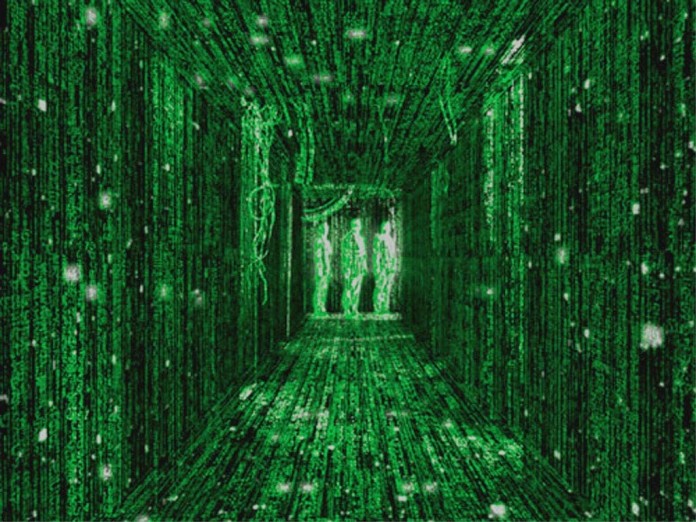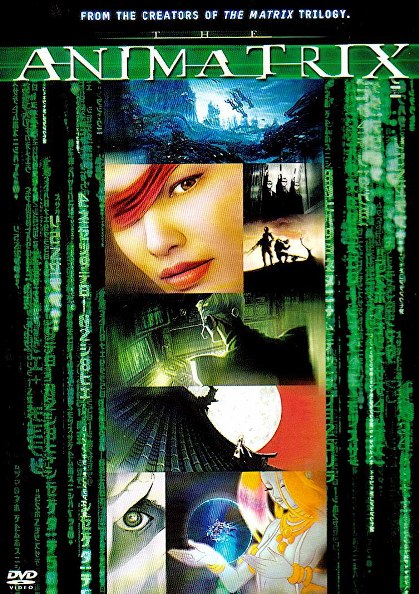Series Review: The Matrix

This week, I take on what is one of the biggest cult sci-fi franchises of the late 90s and early 2000s - The Matrix. Most people have seen at least the first in the trilogy, and many, much to their dismay, paid to see them all. There was also a not-as-well-known anthology of animated shorts revolving around the mythology of The Matrix entitled The Animatrix. And while the Wachowskis (creators and directors) created what I and many others consider a science fiction masterpiece with the first Matrix film, they couldn’t keep steam and the following two flicks lost the philosophical intent of the original.
The Matrix (1999) -
The first flick brings us into the world of The Matrix via Mr. Thomas Anderson, AKA Neo. He’s a regular guy working a regular office job that just happens to do some hacking on the side. But when he begins to get mysterious messages from someone on the other end of his computer, things get strange. As it turns out, Neo is not in the real world. In fact, everything about the real world is just a computer simulation, a front for computers who are using real-world bodies as energy sources and need a way to keep the minds of their batteries satisfied. With the help of a man calling himself Morpheus, Neo breaks free of his prison and must search out the clues to whether he is The One - a prophesized messiah who will come and deliver mankind from the tyranny of the machines.
The first Matrix film is filled almost to overflowing with both subtle and overt philosophical and religious messages. Reality is called into question in many ways as is the nature of humanity. Though the overall plot is humans vs. machines, it goes far beyond that simplicity. The Matrix is incredibly complicated in all the questions that it puts forth for the audience. In addition, the movie brought to cinema a wide range of special effects and cinematography that was previously unused, creating a revolution within the way people perceive and execute films today. The Matrix not only changed people’s perception, it truly caused ripples within the very fabric of filmmaking, a change that has made movies better for the evolution. In my opinion, the original Matrix film is one of those movies that everyone should see at least once.
The Matrix Reloaded (2003) -
And here is where the franchise begins to fall apart. The second Matrix film again follows Neo, though this time he is willingly reentering the computer-generated world in order to find the source of the Matrix. In the meanwhile, the real world is going straight to hell as the machines have decided to march upon the last bastion of humankind. If Neo cannot figure out how to defeat them, then the free population of human beings will be wiped out for good.
With The Matrix Reloaded, the Wachowskis were unable to follow-up on their original flick with the same level of insight, resorting instead to overblown action scenes and special effects gimmicks. This movie is also part of a two-movie series that came out in the same year - actually, a rather revolutionary way of releasing films at the time. And while there is a great story lurking beneath the surface of all the explosions and wire-fu, it gets lost amongst the action. The Matrix Reloaded contains one of the only action scenes I have ever seen that was so long and repetitive that it actually put me completely to sleep during the middle of the film. The only redeeming quality of the film is the very end, when Neo gets to speak with The Architect, a revelation of intriguing plot that is more akin to what the first film had to offer.
The Matrix Revolutions (2003) -
Last, and most certainly least, came The Matrix Revolutions. The clock is ticking in this one, as the machines in the real world are on their way to destroy mankind for good. Neo is seeking answers, but must contend with a now viral version of his nemesis, Agent Smith. Ultimately, the movie comes down to one gigantic battle between man and machine (impressive to look at) and a more annoying battle between Neo and a million copies of Smith.
In this final installment, the audience gets little real story, the movie instead focusing on filling in plot holes and showing us how many Smiths and robot enemies they could get on the screen at one time. By this time, almost all the relevant philosophy and social statement has been leeched from the franchise, leaving little more than a fancy looking sci-fi action flick with no heart.

The Animatrix (2003) -
Often over-looked (and even completely unknown to many), while they were making the second two Matrix films they also produced an anthology of short, animated films based around the mythology of The Matrix. This, aside from the first flick, is by far my favorite entry into the franchise. The many writers and animators created stories that emphasized the spirit of the original film. As is often the case, those who watched from the outside and enjoyed the first film were more aware of what made it great than the creators themselves. Thus, The Animatrix brought brilliance and creativity even as the final two films fell into disarray. If you’ve seen the trilogy, you should not miss out on this great collection.
The numbers at Rotten Tomatoes, if they are to be believed, confirm my analysis among the general population. The first Matrix ranked in at 87/81%, while the second one only garnered a 73/74%. And the third, a rather harsh 36/70. The Animatrix, however, broke the trend with a divisive 88/68%. While I do think the first should have been ranked even higher for its intelligent script and creative action, the others I feel are pretty much spot-on. For those that haven’t seen The Matrix (there might be a few of you out there, right?), I would recommend watching the first film as soon as possible. Whether you continue from there, that’s up to you.
Matrix still courtesy of dan-dare.org
Animatrix cover courtesy of joblo.com

3 comments